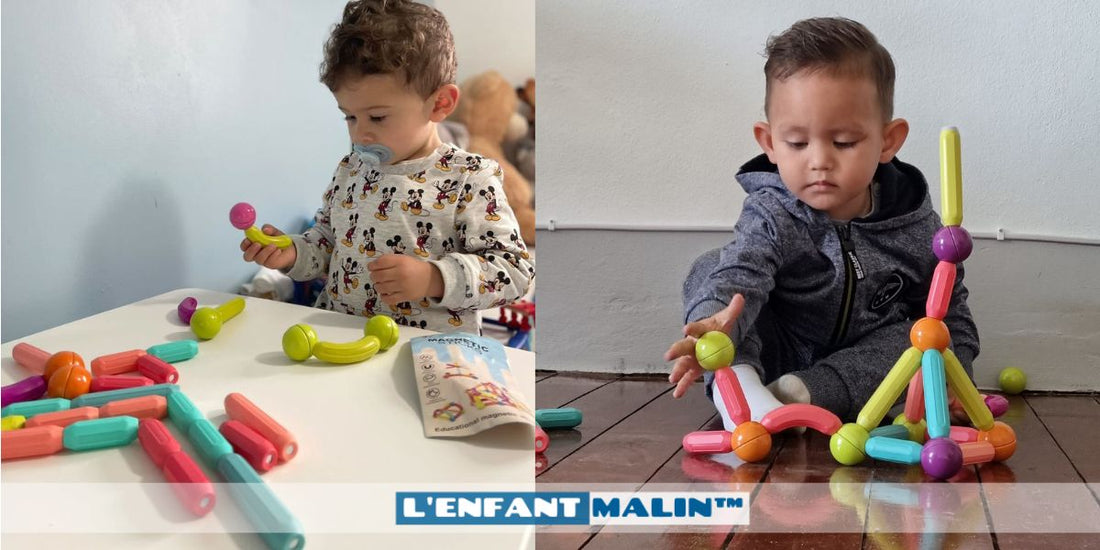Can magnetic games help children develop fine motor skills and spatial thinking?
magnetic toys are becoming more and more popular with parents and children. They allow children to learn certain important concepts. They offer them the opportunity to discover and enrich themselves with new experiences. By familiarizing your children with this type of educational toy, you will be able to help them develop certain essential skills.
A tool to develop spatial thinking
Thanks to magnetic toys, children have the opportunity to:
- Encourage spatial thinking,
- Improve their motor skills and their ability to problem solve,
- Better understand the basics of physics and certain natural phenomena, etc.
For magnetic toys to have the desired effect, it is important to select a game suited to the child's age. If he has difficulty handling magnetic toys, he feels frustrated. He may quickly lose interest in his new toys.
It should be noted that some magnetic toys have small parts that can be easily swallowed by toddlers. This is why specialists do not recommend them for children under three years old. Even if the toy is dedicated to an older child, make sure that he does not put the parts of the toy in his mouth.
Play accessories suitable for young and old
On the market, there are many Montessori toys suitable for all ages. Some magnetic building sets are made up of multiple toy magnet shapes and building blocks. They are made up of different shapes like squares, rectangles and triangles. Little ones can use it to build shapes such as a house, animals, cars, etc. They will have the opportunity to use their creativity to create many attractive shapes.
Certain magnetic games have been adapted to the pedagogy of Maria Montessori. They promote children’s autonomy. They will be able to increase the difficulty level of the game as they grow. They will have the opportunity to invent new forms each time, which will stimulate them. A perfect example is the famous magnetic and evolving game Magnet-Me™.
A way to educate children
Educational games such as magnetic games have a positive impact on the development of children's sensorimotor skills. They help improve fine motor skills in older children. They will be able to develop certain skills in DIY activities. They will also have the opportunity to develop their personality and their communication skills.
Certain educational games such as magnetic games help to increase children's IQ. They support concentration, coordination and memory. These activities allow them to expand their creativity. When playing, the child must carefully place each piece to preserve the balance of the blocks and so that they do not collapse.
Criteria to take into account when choosing the magnetic game
- Take an interest in the materials used to build the game
Children tend to put their toys in their mouths. This is why, for their well-being, it is necessary to check the materials used in the manufacture of magnetic toys. The latter must meet French or European standards (NF or CE marking). Avoid magnetic toys made with poor quality plastics. They contain harmful substances that can harm the health of children.
- Find out information about possible constructions
At the time of purchase, find out about the possible constructions with the magnetic game. If the game is made up of different kinds of blocks, the child is not likely to get bored easily.
Magnetic toys according to the child’s age
For a child aged 1 to 2 years, it is advisable to opt for large, colorful magnetic toys. At this age, little ones tend to like to touch, smell and explore things. children who are between 3 and 5 years old are energetic and curious. They like to develop their imagination. It is recommended to choose simple construction sets and magnetic drawing boards.For example, for this type of age, games such as RainbowCactus™ allow a very educational first approach.
When a child is between 6 and 8 years old, they enjoy inventing things and solving problems on their own. Focus on open construction games that allow him to give free rein to his imagination. For a child aged 9 to 12 years old, choose games that reflect their personality. For example, choose magnetic dartboards.
To discover all the advantages of this type of educational game, do not hesitate to consult our article: "The advantages of using magnetic games for children's learning" .

